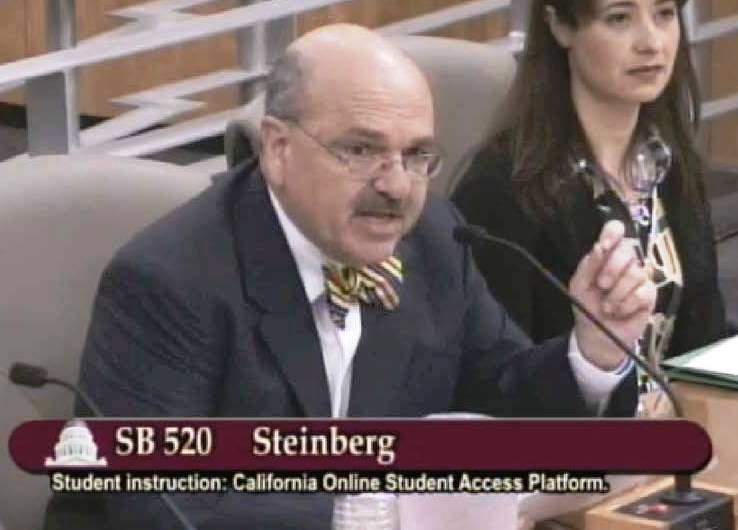June 2013
Academic Council Voices Concerns about Online Ed Legislation in Sacramento

On April 24, the Academic Council met in Sacramento to allow UC faculty leaders to testify in opposition to Senate Bill 520 at a hearing of the state Senate Education Committee. SB 520 is sponsored by Senate President Pro Tem Darrell Steinberg and would require California colleges and universities to partner with third party providers to develop and offer lower division and general education courses for credit in all three segments. Senator Steinberg has amended the bill twice since first introducing it – partly in response to opposition by the three segments' academic Senates – but its key provisions remain.
If enacted, SB 520 would govern how the three segments use the funds the Governor's budget carves out of each segment's budget increase for development of online courses. UC has developed its own initiative (See ILTI story, page 2) for those funds, which would target development of UC-quality courses and the necessary infrastructure to facilitate cross-campus enrollment.
At the April hearing, Senate Chair Robert Powell provided formal testimony against the bill, and each Academic Council member present made a statement in opposition during the public comment period. Representatives of the California State University and California Community College Academic Senates also joined UC in testifying against the bill.
“This unified opposition was a powerful visual demonstration that SB 520 is wrong for California public higher education,” says Chair Powell.
Chair Powell and Vice Chair Jacob also published an open letter to members of the Academic Senate on March 15 outlining their reasons for opposing the bill and an op-ed in the March 30 issue of the San Diego Union Tribune, they emphasized the need for faculty oversight in the development of online courses within existing course approval processes to ensure integrity and quality. Academic Senate Chair Powell, Vice Chair Jacob, President Yudof, and Associate Vice President for State Governmental Relations Steve Juarez also met with Senator Steinberg and his staff to explain their reasons for opposing the bill. In addition, Senator Steinberg’s staff met with the Intersegmental Committee of the Academic Senates on April 29 regarding the bill.
The State Senate Education Committee voted to approve the bill on May 1; it passed out of the Senate on May 30; and it must now go to the Assembly and, if passed there, to the Governor.
Senator Steinberg's amendments do not eliminate the provision requiring the colleges and universities to collaborate with private, third-party providers to develop courses that are accepted for credit in all three segments and are available to both matriculated students and high school students through a single portal.
“The UC faculty will not support the privatization of public education or shirk our responsibility to our students by ceding authority over courses to any outside agency,” states Powell. “A UC course cannot be replaced with video lectures and computer scored template assignments provided by an outside vendor. UC students deserve UC instructors. Our basic courses are necessary steps for our students’ success in advanced courses and beyond UC. We cannot outsource them without betraying our students’ trust and compromising quality. Shortcuts will shortchange our students.”
At the same hearing of the Senate Education Committee on April 24, Senate Vice Chair Bill Jacob testified about SB 547, sponsored by Senator Marty Block, which would have required the faculty senates of all three segments to develop or identify online courses that would satisfy high-demand lower division requirements for transfer by Fall 2014 and make them available across all three segments. UC issued a Support if Amended position on SB 547 supporting the development of infrastructure that would facilitate the ability to offer online courses across campuses within a segment, rather than across segments, and a phased in approach to intersegmental articulation after further study. On May 23, SB 547 was held on the Senate Appropriations Committee’s suspense file, effectively killing it for this year's legislature.
“The Senate has been engaged in an unprecedented amount of legislative advocacy this year. It began last fall with our advocacy around Proposition 30, continued in the winter with BOARS’ and UCORP’s meetings in Sacramento, and culminated with the Academic Council meeting," said Chair Powell. "I hope these experiences have helped to engage and inspire faculty members rather than disillusion them and that they have changed the way legislators view University of California faculty.”
